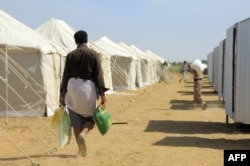The U.N. humanitarian chief warned Tuesday that aid to millions of Yemenis is in jeopardy as donor funding is rapidly running out.
"In December, the World Food Program reduced food rations for 8 million people," Martin Griffiths told the U.N. Security Council. "Starting next month, those 8 million may get no food at all, or just a reduced ration."
He said that in March, the humanitarian flights that ferry food, supplies and aid workers into the country may have to be suspended.
Nearly 21 million Yemenis, more than two-thirds of the population, need humanitarian assistance.
The U.N. has appealed for $3.85 billion for 2022, but the donors are not stepping up.
"The scale of the current gaps are unprecedented in Yemen," Griffiths said. "We have never before considered giving hungry people no food at all."
Last week, he released $20 million from the U.N.'s emergency humanitarian fund to Yemen. It was the second time he has done so this year.
"If these gaps are not addressed, it will simply be a death sentence for people whose coping mechanisms, in some cases, are completely exhausted and rely on assistance for their survival," Griffiths warned.
Sweden and Switzerland are co-hosting a high-level pledging conference for Yemen with the United Nations on March 16.
The country is in the seventh year of a brutal war that has pushed it deeper into poverty.
In September, fighting escalated between Saudi-backed government forces and Iranian-supported Houthi militants and intensified in January.
Griffiths said more than 650 civilians were killed or wounded in January, the highest toll in at least three years.
The environment is also dangerous for those trying to help the population.
On Friday, armed men abducted five U.N. staff members on an official mission in the southern Abyan governate. Griffiths said the United Nations is working to secure their release.
"These incidents are utterly unacceptable," he said.





